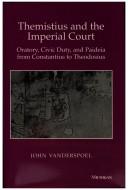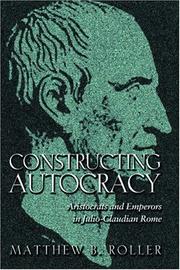| Listing 1 - 10 of 42 | << page >> |
Sort by
|
Book
Year: 1606 Publisher: Printed at London : [By H. Lownesand G. Snowdon] for Mathew Lownes,
Abstract | Keywords | Export | Availability | Bookmark
 Loading...
Loading...Choose an application
- Reference Manager
- EndNote
- RefWorks (Direct export to RefWorks)
eebo-0018
Roman emperors --- Rome --- History
Book
ISBN: 1781666350 4057664593160 9700000004250 Year: 2012 Publisher: [Luton] : Andrews UK Limited,
Abstract | Keywords | Export | Availability | Bookmark
 Loading...
Loading...Choose an application
- Reference Manager
- EndNote
- RefWorks (Direct export to RefWorks)
Emperors --- Caesars --- Decennalia --- Roman emperors
Book
ISBN: 0713454288 9780713454284 Year: 1987 Publisher: London : Batsford,
Abstract | Keywords | Export | Availability | Bookmark
 Loading...
Loading...Choose an application
- Reference Manager
- EndNote
- RefWorks (Direct export to RefWorks)
Roman emperors --- Biography --- Marcus Aurelius, --- Biography.
Book
Year: 1636 Publisher: London : Printed by N. and I. Okes, and are to be sold by George Hutton at the signe of the Sun within Turning-stile in Holborne,
Abstract | Keywords | Export | Availability | Bookmark
 Loading...
Loading...Choose an application
- Reference Manager
- EndNote
- RefWorks (Direct export to RefWorks)
eebo-0018
Book
ISBN: 0713444649 9780713444643 Year: 1984 Publisher: London: Batsford,
Abstract | Keywords | Export | Availability | Bookmark
 Loading...
Loading...Choose an application
- Reference Manager
- EndNote
- RefWorks (Direct export to RefWorks)
Emperors --- Empereurs --- Biography --- Biographies --- Nero, --- Rome --- History --- Histoire --- -Roman emperors --- Roman emperors --- Biography. --- Roman emperors - Biography --- Emperors - Rome - Biography --- Rome - History - Nero, 54-68
Book
Year: 2019
Abstract | Keywords | Export | Availability | Bookmark
 Loading...
Loading...Choose an application
- Reference Manager
- EndNote
- RefWorks (Direct export to RefWorks)
drawings [visual works] --- Roman emperors --- Campi, Bernardino --- Titian
Book
Year: 1571 Publisher: Imprinted at London : by Thomas Marshe,
Abstract | Keywords | Export | Availability | Bookmark
 Loading...
Loading...Choose an application
- Reference Manager
- EndNote
- RefWorks (Direct export to RefWorks)
eebo-0018

ISBN: 0472104853 Year: 1995 Publisher: Ann Arbor : University of Michigan Press,
Abstract | Keywords | Export | Availability | Bookmark
 Loading...
Loading...Choose an application
- Reference Manager
- EndNote
- RefWorks (Direct export to RefWorks)
Themistius --- Relations with Roman emperors --- Rome --- Kings and rulers --- Politics and government --- Rois et souverains --- Politique et gouvernement --- -Temistio --- Themistios --- תאמסטאוס --- ثامسطيوس --- Kings and rulers. --- -Themistius. --- Relations with Roman emperors. --- -Relations with Roman emperors --- -Themistius --- Themistius. --- 284-476 --- Themistius - Relations with Roman emperors. --- Rome - Kings and rulers. --- Rome - Politics and government - 284-476. --- Temistio --- Θεμίστιος

ISBN: 1134735456 1134735464 1280151080 0203982312 9780203982310 9780415154031 0415154030 6610151083 9786610151080 0415154030 9781134735419 9781134735457 9781134735464 9781138007031 Year: 1999 Publisher: London ; New York : Routledge,
Abstract | Keywords | Export | Availability | Bookmark
 Loading...
Loading...Choose an application
- Reference Manager
- EndNote
- RefWorks (Direct export to RefWorks)
The Rome that Did Not Fall provides a well-illustrated, comprehensive narrative and analysis of the Roman empire in the east, charting its remarkable growth and development which resulted in the distinct and enduring civilization of Byzantium. It considers:* the fourth century background* the invasions of Attila* the resources of the east* the struggle for stability* the achievements of Anastasius.
Emperors --- Byzantine emperors --- Caesars --- Decennalia --- Roman emperors --- Byzantine Empire --- Rome --- Europe --- History

ISBN: 069105021X 9780691171418 1336196025 1400824095 0691171416 1400814561 1400817757 Year: 2001 Publisher: Princeton (N.J.) : Princeton university press,
Abstract | Keywords | Export | Availability | Bookmark
 Loading...
Loading...Choose an application
- Reference Manager
- EndNote
- RefWorks (Direct export to RefWorks)
Rome's transition from a republican system of government to an imperial regime comprised more than a century of civil upheaval and rapid institutional change. Yet the establishment of a ruling dynasty, centered around a single leader, came as a cultural and political shock to Rome's aristocracy, who had shared power in the previous political order. How did the imperial regime manage to establish itself and how did the Roman elites from the time of Julius Caesar to Nero make sense of it? In this compelling book, Matthew Roller reveals a "dialogical" process at work, in which writers and philosophers vigorously negotiated and contested the nature and scope of the emperor's authority, despite the consensus that he was the ultimate authority figure in Roman society.Roller seeks evidence for this "thinking out" of the new order in a wide range of republican and imperial authors, with an emphasis on Lucan and Seneca the Younger. He shows how elites assessed the impact of the imperial system on traditional aristocratic ethics and examines how several longstanding authority relationships in Roman society--those of master to slave, father to son, and gift-creditor to gift-debtor--became competing models for how the emperor did or should relate to his aristocratic subjects. By revealing this ideological activity to be not merely reactive but also constitutive of the new order, Roller contributes to ongoing debates about the character of the Roman imperial system and about the "politics" of literature.
Aristocracy (Political science) --- Class consciousness --- Emperors --- Rome --- History --- Aristocracy --- Political science --- Caesars --- Decennalia --- Roman emperors --- Consciousness --- Social perception --- Social classes
| Listing 1 - 10 of 42 | << page >> |
Sort by
|

 Search
Search Feedback
Feedback About UniCat
About UniCat  Help
Help News
News